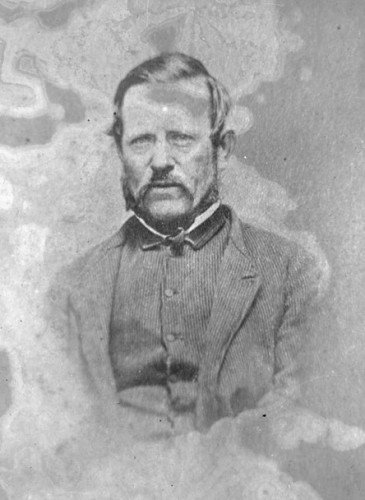South Coast NSW History Story
H J Bate
Henry Jefferson Bate – the Aboriginals’ Friend
When Henry Jefferson Bate, one of the pioneer settlers in the Tilba area, died in 1892, King Merriman (the chief of the Wallaga Lake Aboriginals) ‘clasped his hands over his head, tears streaming down from his eyes crying “Oh my poor old master, you’ve gone away, you’ve left me, my poor old master”.’
Henry was respected by the local Aboriginals. He respected the local Aboriginals.
It seems that when Henry moved to his Mountain View farm in Tilba Tilba in 1869 he employed local Aboriginals, including Merriman, to help clear his farm and then to work on the farm. Evidently ‘he gave them a big steak, bread and stew as pay…and they cleared all the property.’
Bate’s move to Tilba coincided with moves by Aboriginals to regain some of the land they had lost to European settlers. Increasingly Aboriginals were being denied access to lands that had been used to gather food or that had cultural significance to them, and they were losing traditional camping areas. So, they sought land with a freehold title that would ensure they would have a secure future.
The government at the time supported these initiatives in the belief that this could help make Aboriginals self-sufficient. It was not their intention to deliberately segregate Aboriginals from the wider population.
In 1874 Crown Camping Reserves were created on the north-eastern shore of Wallaga Lake. Henry Bate and another neighbouring landholder, John Thomas Hobbs, may have helped facilitate this initiative. Several years later, two 18’ whaleboats were provided to the Wallaga Aboriginals by the government (one of which was to be skippered by Merriman).
In early 1880, Henry Bate approached the government, on behalf of Tilba Aboriginals, asking for more land to be provided to local Aboriginals. This resulted in 380 acres of Crown Land being ‘reserved from sale for public purposes’ which, a year later, was ‘reserved from sale for the use of the Tilba Tilba tribe of aborigines’ when Henry Bate, John Forster and John Dawson were appointed Reserve Trustees.
Much of this land is now the site of the Wallaga Lake Koori Village.
Henry Jefferson Bate is reputed to have told local Aboriginals at the time: ‘You people can keep this land, it belongs to you. It’s your home ground,’ indicating that he was one of Australia’s earliest supporters of Aboriginal land rights.
In December 1886 an application was made to establish a Provisional School (an elementary school which was expected to cater for 15 to 25 attendees, usually staffed by an untrained teacher. Most Aboriginal schools at that time were Provisional Schools) on the Tilba Tilba Reserve. Again, Henry Bate instigated the move remarking ‘the education of the young aborigines…heretofore has been totally neglected.’ A local landholder, James Reece, volunteered to become the teacher, and his offer was accepted.
The Education Department viewed this new school as ‘an experiment’ and the school teacher as ‘a sort of head of settlement’ who would ‘encourage the men to build houses, to cultivate land etc.’, and who would ‘be called on more to govern and influence the children than to simply teach them.’
At the Education Department’s request, the Aborigines Protection Board provided rations and clothing to students who regularly attended school.
The school was successful, and James Reece proved to be both a capable schoolteacher and Reserve administrator. In fact, the school (and the rations that were available to those who attended) attracted more families to the Tilba Tilba Reserve, with, for example, rations being provided to nine adults in 1886 and to 14 adults just one year later. By 1891, the year before Henry Jefferson Bate died, there were 93 people from 12 families living in the Wallaga Lake Reserve (as it had been gazetted that year), with many (all but two of the families!) moving there from Gippsland, the Monaro and coastal areas well north of Wallaga Lake.
(A note on H.J. Bate: there have been three H.J. Bates – which often confuses unwary historians: Henry Jefferson Bate (1816 – 1892), Henry John Bate (1881 – 1967, who was often referred to as ‘HJ’), and Henry Jefferson Percival Bate (1906 – 1984, commonly referred to as ‘Jeff’))
Sources: Information from Harry Bate, Tilba; ‘Tilba Times Revisited’ by Laurelle Pacey
